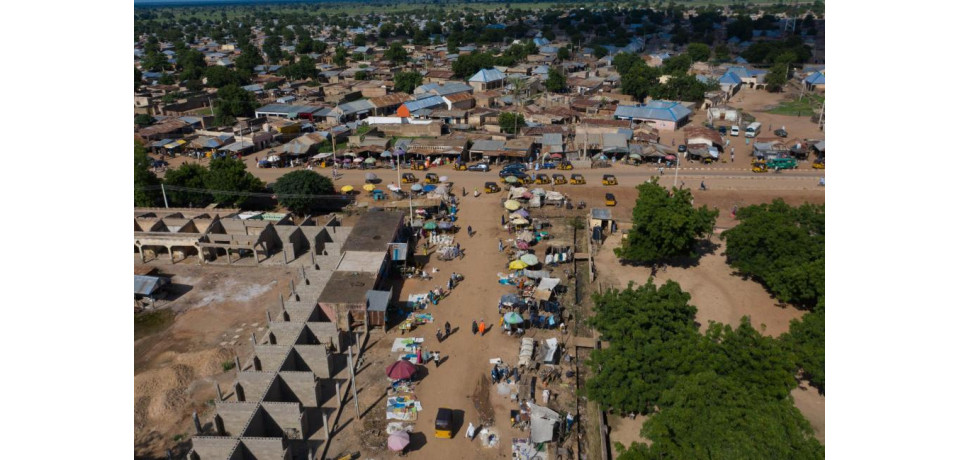PRESS RELEASE| IOM and UNDP Team Up to Find Migration and Development Solutions in West and Central Africa
Objectifs de Développement Durable Connexes et Objectifs du Pacte Mondial sur les Migrations
Originally posted on rodakar.iom.int and undp.org.
Dakar – The International Organization for Migration (IOM) and the UN Development Programme (UNDP) have teamed up to tackle migration and development issues prevalent in the West and Central Africa (WACA) region.
This partnership established through a joint letter signed by the IOM Director General, Antonio Vitorino, and the UNDP Administrator, Achim Steiner, will build on strong collaboration among both entities to foster scalable and joint sustainable development and migration interventions in support of national and local governments that align with the work of the broader UN system.
"Conflict, climate change, and labour market changes are among the drivers of migration and displacement and cannot be approached in isolation," said Christopher Gascon, Regional Director, IOM Regional Office for West and Central Africa. "This partnership provides a pragmatic and long-term vision to tackle migration and development issues jointly while empowering migrants to contribute to economic development in the region," he added.
The WACA region stretches from the semi-arid areas in the Sahel Region to countries along the Gulf of Guinea, spanning 24 countries [1] that range from high and middle-income economies to least-developed countries and countries in crisis and post-crisis situations.
According to the World Bank, the region is home to about half a billion people and is experiencing a population spike, about 64% of which are under the age of 35, making it a region with one of the youngest populations in the world. The region possesses brimming mineral resources and boasts a GDP of nearly $800 billion.
However, issues surrounding political instability, violent extremism and food insecurity continue to trend upward, placing pressure on WACA countries where according to OCHA, over 61 million people require humanitarian assistance, and more than 28 million are facing acute food insecurity – the largest in the region since 2014. These trends have significantly contributed to the more than 8.2 million internally displaced persons (IDPs) and 1.5 million refugees and asylum-seekers currently in the West and Central African region, according to IOM and have impacted the ability of countries to harness their potential and their differentiated abundance of opportunities.
"Migration can be transformational in nature as it goes beyond the movement of people to their impact on the society they go to. Our interest lies in creating a new reality for migrants and building a new narrative around migration, particularly in West and Central Africa. said Njoya Tikum, Manager, UNDP Sub-Regional Hub for West and Central Africa. "The Joint letter affirms that our organizations both believe in the sustainable development impact of migration. Hence, we have an opportunity to translate our corporate commitment into impactful actions," he added.
The partnership will focus on two broad thematic areas:
- Resilience to adverse effects of climate change and durable solutions to displacements: among others including Resilience and Disaster Risk Reduction and Conflict-induced Migration (notable IDP situations in the region); Social Cohesion and Conflict Prevention; Green Jobs and Nature-Based Solutions.
- Migration governance & development: among others, including Fostering Mobility in the region by enhancing the role of Migration in Development through Labour Migration, Trade and Mobility in line with the African Continental Free Trade Area (AfCFTA) & Free Movement Protocol (FMP); Socio-economic Inclusion; Youth and Women Empowerment; Digital Transformation; Border Governance (including strengthening State presence and capacities at the border, Integrated Border Management, Identity Management and Legal Identity of migrants/people on the move.
For more information, contact:
Halima Djigo, Media Relations Officer, IOM Regional Office for West and Central Africa, hdjigo@iom.int
Ugochukwu Kingsley Ahuchaogu, Regional Communications Analyst, UNDP Sub-Regional Hub for West and Central Africa, ugochukwu.kingsley@undp.org
----
[1] The WACA region spans 24 countries - Benin, Burkina Faso, Cameroon, Cape Verde, Central African Republic, Chad, Côte D’ivoire, Democratic Republic of Congo, Equatorial Guinea, Gabon, The Gambia, Ghana, Guinea, Guinea-Bissau, Liberia, Mali, Mauritania, Niger, Nigeria, Republic of Congo, Sao Tome & Principe, Senegal, Sierra Leone and Togo.
